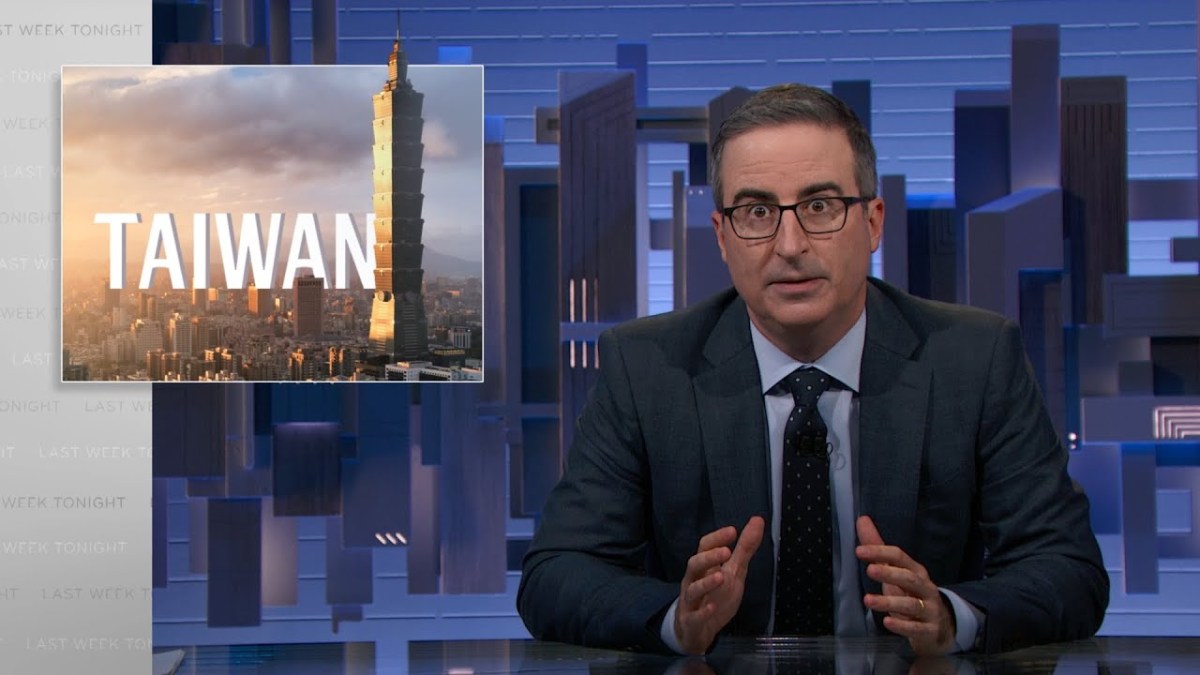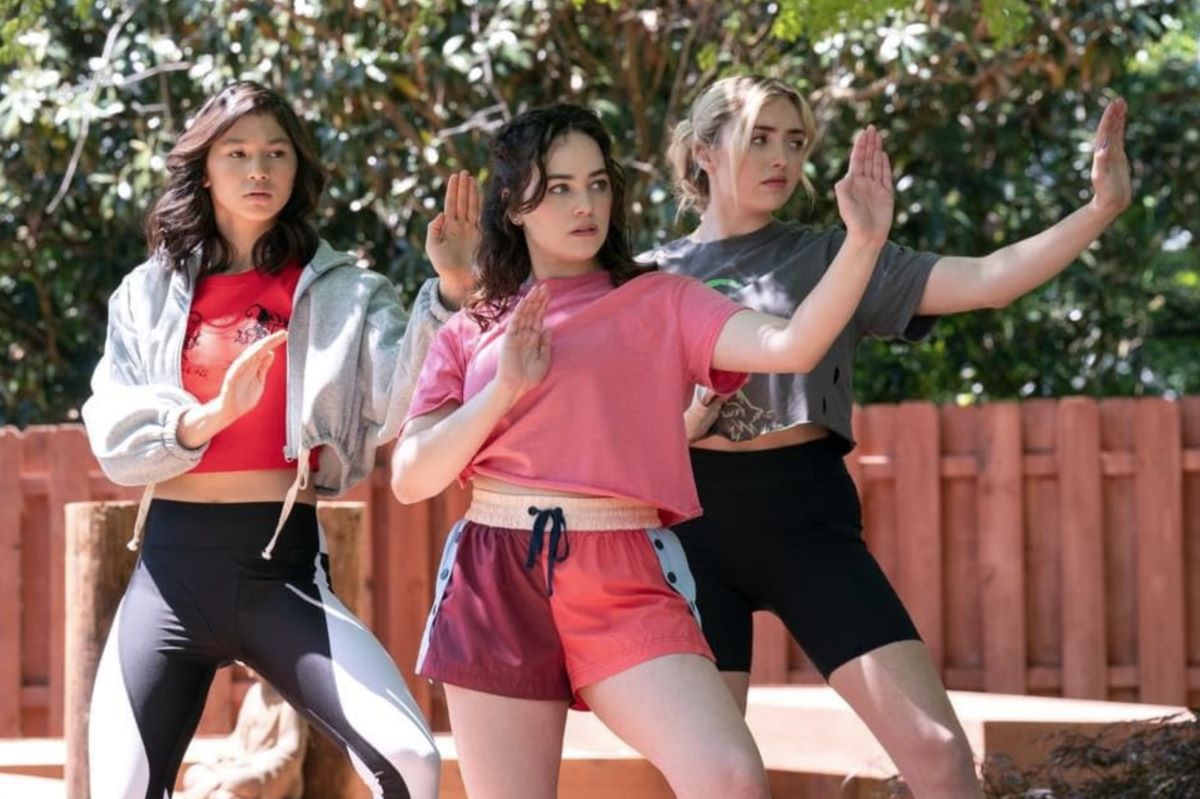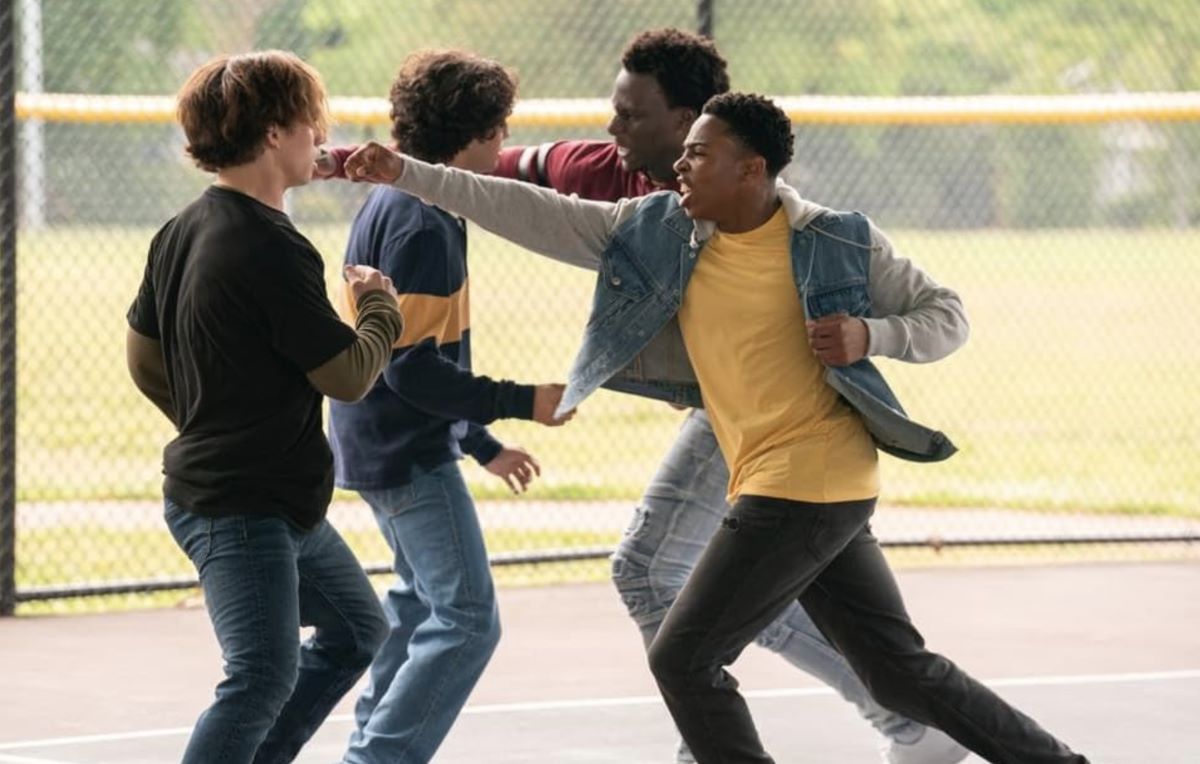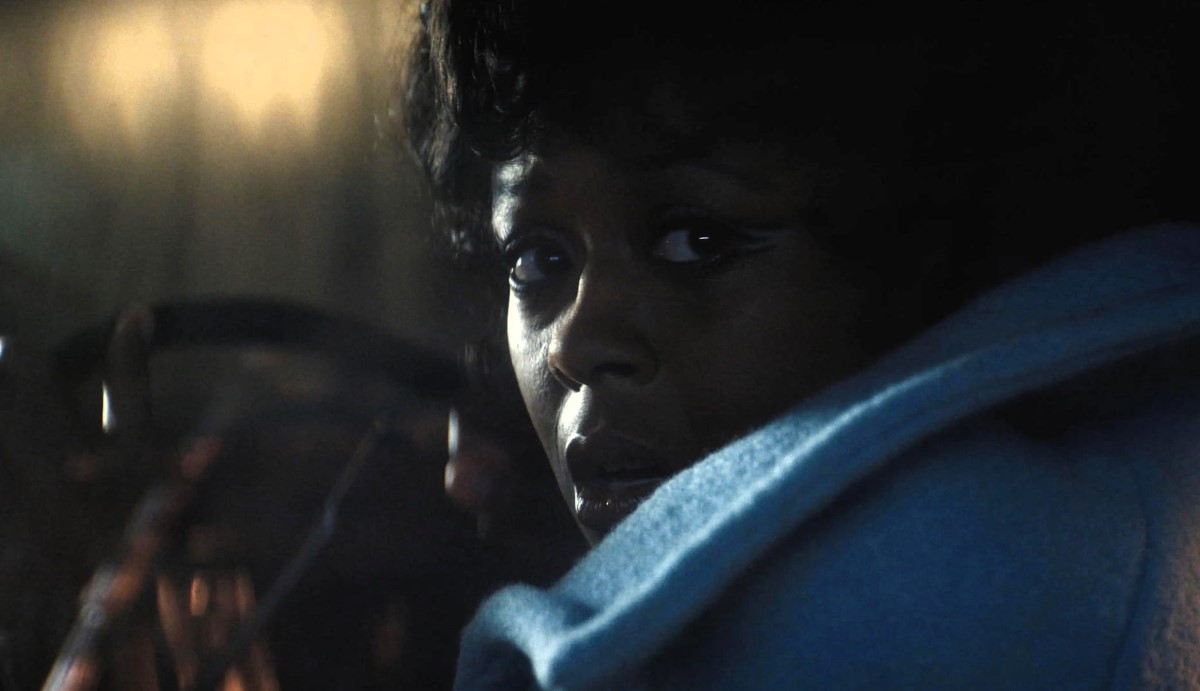Last Week Tonight with John Oliver
Season 8 Episode 27
Aired on October 24, 2021
Main segment: Political status of Taiwan
Other segments: Police resignations due to COVID-19 related precautions
* * *
♪ ♪
John: Welcome, Welcome, welcome to “last week tonight!” I’m John Oliver. Thank you so much for joining us. Just time for a quick recap of the week, which has been busy. The CDC expanded eligibility for booster shots, the house voted to hold Steve Bannon in contempt of congress, and Adele wore the shit out of this head to toe chocolate leather outfit. No one’s worn chocolate that well since Augustus Gloop. That’s a fashion fact. But we’re going to start with this.
In police departments nationwide, a crush of vaccine mandates are a flash point for officers faced with rolling up their sleeves or losing their jobs.
In Leesburg, Virginia, some officers say they may quit if the vaccine mandate moves forward.
In Massachusetts, the state police union believes at least 150 state police officers will resign.
One trooper who decided to quit had some choice words for the governor on the way out.
This is the last time you’ll hear me in a state patrol car. And Jay Inslee can kiss my ass.
John: Wow, a walkie drop! You don’t see many of those! And that’s probably because it looks pathetic. Dropping a microphone is inherently exciting. You get the thud as it hits the floor, and the cheer of the crowd, but a walkie drop? That’s just a sad man sitting in a dark car, dropping a heavy object directly onto his penis. But it’s true. All over the country, a small minority of police officers have received disproportionate coverage after threatening to resign over Covid mandates. They’ve framed this as a matter of individual liberty, even in cases where very little was being asked of them. In Chicago, officers were merely asked to register their vaccination status on a portal, and for now can still work if they’re unvaccinated, so long as they’re regularly tested. But nevertheless, John Catanzara, the head of Chicago’s fraternal order of police, told his officers flat out, “do not comply with any direct order to fill out the portal, period.” He’s actually been especially vocal in his opposition to vaccine mandates for officers, including an offensive statement that I’m not going to repeat, I’m just going to show you his apology for it, because I do think you’ll be able to work it out from context.
In no way was I trying to tie forced vaccinations to the atrocities of the holocaust, which is why I never used the word holocaust. I should not have made the reference like I did to the showers and for that I am sorry.
John: Wow, just a big yikes to everything going on there. Setting aside the pronunciation of “hole-ocaust” — and believe me, I have nothing but questions about that — arguing that, “technically I never said the word holocaust, I just referenced the showers” is totally absurd. And finally — and this is probably the least important thing to say here — at least center yourself in the fucking frame! It’s just not that hard! A quick scootch of the laptop and you’re there. And look, I don’t want to be in the business of art directing “hole-ocaust” non-apologies, but frankly, you’ve left me no choice. And you should know, even by the subterranean standards of the Chicago PD, this guy is a lot. He has been suspended eight times and has received more misconduct complaints per year of service than 96% of his fellow Chicago officers. And yet, this is who his union members chose to represent them. So next time someone says to you, “not all cops are bad,” you can respond, “no, just their favorite ones!” And Catanzara’s hostility to a vaccine mandate is particularly noteworthy given one of his predecessors as head of the union died of Covid just this month. Which actually brings us to a staggering fact.
Since the start of the pandemic, more than four times as many officers have died from covid-19 as from gunfire. This despite being among the first groups to have access to show the vaccine.
John: Yeah. Four times more police officers have died from Covid than gunfire. That’s a terrible statistic, which you might not fully absorb, given that CNN’s graphics department represented it with one bar that’s only about twice as big as the other. So welcome to CNN. If you want to instantly understand the different ways police die, it’s going to be tricky. But if you want to understand the one way a certain British royal died, it’s your lucky day! 9:00 P.M. Eastern, Sunday nights. Though no need to watch. Spoiler alert, it was the mother-in-law. There’s also the key matter of the fact that the police are supposed to be keeping the public safe. That’s the point of their jobs. Yet some don’t seem to give much of a shit about that. Take this video of NYPD officers flipping out over a subway rider who simply asked them to put on a mask.
Cell phone video taken Tuesday morning shows an unmasked NYPD officer pushing a masked commuter out of the 8th street subway station and closing the emergency exit door. As the cop walks away, he says.
You’re being disruptive.
John: Okay, first, you opened the emergency door? Oh, no! Everyone in New York knows you can’t open the emergency door! Not unless it’s an emergency! Also, disruptive? Have you ever been on the subway? You know, the big metal worm that screams? The place where every day, you see the biggest rat to ever walk the earth and then you just go to work like it’s nothing? You’re in disruption junction, baby. It’s also worth remembering that New York still has a mask mandate on public transit, and anyone caught without one risks a $50 fine — except, apparently, the cops. And this all sums up the American police problem in miniature. The constant refrain we hear from cops every time they kill an unarmed black person is “they should have complied with commands,” because as long as you comply, things will supposedly go well. But that only seems to work one way. Because when officers are asked to follow simple rules or face consequences, a not insignificant amount of them flip their shit. So you know what? If an officer wants to quit over this, fucking let them. Let the individuals who clearly don’t care about public safety stop being in charge of public safety. It is really that simple. And, by the way, that is a motherfucking walkie drop. Ow. And now this.
* * *
And now, the weather channel’s graphics department is still not fucking around.
Let’s take this car into augmented reality and talk about how the weather impacts your travel.
You take your shoes off like that to get to your spot.
Being close to a raging wildfire like this one is a terrifying experience.
You can see large objects, a truck right here. Those snowmobiles can really pick up speed.
Was as a truly life-threatening.
This is an suv.
You’ve got to be kidding, a bus? I hope this bus stops.
You might get caught off guard.
Trees and started to come down.
What’s that? That’s the magic top hat. The scene with the fog is getting pretty spooky. Watch out, he is coming for you. Where is my broom? This which is out of here.
* * *
John: Moving on. Our main story tonight concerns Taiwan. It’s honestly remarkable that we haven’t talked about Taiwan before on this show given it’s the birthplace of bubble tea, which is delicious, even though tapioca balls sounds like a sex move for people over 70, and especially since Taiwan shares our unhealthy obsession with mascots, cities there make tons of them. There’s this one, the milkfish kid, celebrating one area’s milkfish production. And there’s this one, from a region that produces bananas, which I do not want to talk about. In fact, Taiwan makes so many mascots that in some cities, the very act of storing them has become a problem.
We went with the city councilor to a Taipei public school following her into the depths of a basement parking lot. Here behind a door, we discovered a mountain of abandoned mascots. This is sacred fire baby from 2013 national games held in Taipei.
The city government should really think about whether it’s necessary to keep creating one-off mascots.
John: Oh, come on. You can’t just keep making mascots and throwing them away. Thankfully, at the end of each of our seasons, our mascots go to live on a beautiful farm. A fantastic green farm, where Jeff the diseased lung can breathe fresh air, and the polar bear with a broken penis can get the care he so badly needs. I keep asking my producer where this farm is, and she keeps saying, “I’ll tell you when you’re older.” I can’t wait! But obviously, the major reason Taiwan ends up in the news these days is because of its relationship with China, which, to put it mildly, is fraught. And recently, getting even fraughter.
China has long viewed Taiwan as its own national territory. China’s president, Xi Jinping, on Saturday all but declaring it policy. “The complete reunification of our country must be and will be realized,” he said.
Military tensions between the two sides are soaring. China’s air force sent nearly 150 planes into Taiwan’s air defense zone since the start of this month.
John: Yeah. They did. Not exactly like that, though, in a big stack. I’m presuming they flew the planes out one at a time, not heaped on top of each other like an air traffic controller’s nightmare. The point is, China insists that Taiwan, an independently operating entity with its own democratically elected leaders, armed forces, and constitution, is actually part of China, and in no way a separate country. Here’s an understatement. The Chinese government feels strongly about this. So strongly, in fact, that when John Cena went on a press tour for the most recent Fast & Furious movie and said Taiwan is the first “country” that can watch “F9,” this is what happened next.
Actor John Cena has apologized to China after he called Taiwan a country.
[Speaking mandarin]
John: Every part of that is so weird. It’s weird John Cena apologized to China. It’s weird he did it for calling Taiwan a “country.” And it’s weird to see him do it in pretty decent Mandarin. That’s just too many weird things! I half expect that shot to pan out to reveal he’s also doing a needlepoint of Liam Neeson kissing an ostrich. Honestly, it would only make it slightly stranger. But John Cena isn’t alone. Taiwan is such a third rail for China that it may be why Paramount Pictures removed the Taiwanese flag from Tom Cruise’s jacket for the Top Gun sequel, and it’s definitely why the Gap apologized for releasing this t-shirt featuring a map of China without Taiwan attached. That shirt caused a shitstorm, and it led to the Gap, makers of the t-shirt dads wear while they’re on the elliptical for 30 minutes, apologizing to 1.4 billion people. So if China is getting t-shirt retractions from the Gap, loudly vowing to reunify with Taiwan and sending stacks of war planes towards it in record-breaking numbers, it feels like tonight, it’d be worth taking a look at Taiwan, how it got to be in the unique position it’s in, what the world wants from it, and most importantly, what it wants for itself. And let’s start with how we got here. Historically, Taiwan has been like the Stanley Cup of Asian history, in that different people keep passing it around and carving their names on it. Here’s a ludicrously brief history of the last 400 years there. Taiwan, or as it’s sometimes been called, “Formosa,” was first home to indigenous people, then colonized by the Dutch, and briefly the Spanish, before China’s Qing dynasty held it for about 200 years. Then, in 1895, China lost Taiwan to Japan, which turned it into a so-called “model colony,” imposing Japanese cultural values, and generally ruling it with an iron fist. Then, after World War II, two major things happened. First, the allies put Taiwan back under Chinese control. And second, the civil war that was taking place in China between the nationalist government led by Chiang Kai-Shek and the communists, led by Mao Zedong, ended. Spoiler alert, the communists won. Congratulations to Mao. And in the wake of that defeat, Chiang Kai-shek fled to Taiwan, along with 2 million nationalist soldiers and refugees, basically setting up a Chinese government in exile. Meaning China technically had two governments at the time, one in China, and one in Taiwan. And western countries were very invested in the success of the second one, even calling Taiwan “Free China,” because they saw it as a necessary bulwark against communism.
Against all prophecies, Formosa still keeps the anti-communist flag flying only 100 miles or so off the mainland of China. It’s a prosperous island where the new generations grow up in freedom. A complete contrast to conditions under the rule of Mao Tse-Tung.
John: I do miss that period of human history where the only way to learn about other cultures was to have a British man on amphetamines tell you which were the good ones and which were the baddies. “Here we see Formosans living in freedom. Well, not freedom per se, but the point is, they’re not commies, and that’s where my curiosity terminates.” But while Chiang Kai-Shek might have been a staunchly anti-communist U.S. ally, historically, we’ve had a lot of those, and they often haven’t been great people. And Chiang ruled Taiwan as a brutal authoritarian.
Thousands were swept up in a period that came to be known as “the white terror,” suffering imprisonment, torture, even execution. Doing anything that could be remotely construed as criticism of the government was extremely risky, as one writer discovered when he merely translated a Popeye comic strip.
Popeye and his son were in exile on an island and they were campaigning for election there. Popeye gave a speech and used an English word, “fellows.” There could be hundreds of translations for “fellows,” but I chose one which was, “all my fellow countrymen.” This was terrible. The bureau of investigation arrested me saying, “why didn’t you translate it into something else? This is exactly the way our president Chiang speaks. You are making fun of him. It deserves the death penalty, no doubt, the death penalty.”
John: It’s true. That guy was interrogated for months on suspicion of being a communist collaborator, and ultimately spent nine years in prison, all because Chiang’s government thought a Popeye comic had a hidden political message. Which is a bit of a reach. There is clearly no deeper meaning to Popeye comics, other than women are inherently prizes to be fought over, performance enhancing drugs are cool, and Bluto doesn’t deserve love. All of which is to say, in the middle of the last century, Taiwan was a grim place. But after Chiang died in 1975, under pressure both internationally and from political movements at home, the nationalists began to loosen their grip, ending martial law in the late ’80s and opening the door to full democratization. So against the odds, Taiwan shifted from a dictatorship to a functioning, vibrant democracy, and I do mean vibrant.
A debate over how billions of euros would be allocated for an infrastructure development plan descended into a brawl in Taiwan’s parliament on Tuesday. Members of the ruling democratic progressive party and the opposition nationalists party threw water and shoved each other to the floor. Taiwan’s MPs are known for brawling and even throwing objects at each other. And fights in parliament are even seen as one way for the opposition to show voters that it stands tough on issues.
John: Yeah! Fighting is not uncommon in Taiwan’s parliament. Here they are throwing water balloons at each other. And here they are hurling pig guts during a debate on pork imports. And that’s not all. One time in 2006, a member snatched a written proposal of a bill and shoved it into her own mouth. Which is fantastic, and definitely something we should steal. You want to kill a clean energy bill? Pull up a chair and fucking eat all 900 pages of it. But Taiwan isn’t just a functioning democracy. It’s a major player in the global supply chain. Taiwan was the fastest growing economy in Asia last year, and it’s the world’s key manufacturer of semiconductors, which are used everywhere in products from cars to sex toys. So the next time you fire up a butt plug that has 100,000 times more computing power than the “Apollo” moon mission, make sure you say, “thanks, Taiwan.” So all of this brings us to where we are right now, with Taiwan established as a highly-developed and wealthy country. And yet, no one is allowed to call it one. And that brings us back to the huge, unresolved issue of Taiwanese sovereignty. Because China now sees claiming Taiwan as a key point of national pride, with Xi Jinping calling reunification part of his vision for “the great rejuvenation of the Chinese nation.” And anyone wanting to do business in China knows that calling Taiwan a country is a massive faux pas. And it’s not just the gap and John Cena who’ve found that out. All of these companies have either had to apologize for, or walk back, even the smallest implication that Taiwan is a separate country. And you can see this caution everywhere. At this year’s Olympics, you probably saw Taiwanese athletes competing not under the Taiwanese flag, but under the fake pseudo-flag of “Chinese Taipei,” something they’ve been forced to use at every Olympics since the 1980s when they reached a compromise with the IOC that allowed them to participate without angering China. But this arrangement isn’t something that all Taiwanese people appreciate. In fact, during the 2012 games, the lead singer of Taiwanese heavy-metal band chthonic pointed out how ludicrous it is.
Our team, our national team’s been called Chinese fucking Taipei. Fucking bullshit, right? “Oh, we can’t call you Taiwan, sorry. We have to call you Chinese fucking Taipei.”
John: I know I say this every week, but that death metal singer complaining about Olympic nomenclature has a point. Although, to be fair, if their official Olympics name really was “Chinese fucking Taipei,” that would at least be a little more accurate vis-a-vis who’s fucking whom. And even huge international organizations like the W.H.O.. Are forced to play this ridiculous game, freezing out Taiwan from full participation. Last year, when one W.H.O. official was pressed on this point by a Hong Kong newscaster, it led to this very awkward interaction.
Will W.H.O.. Consider Taiwan’s membership? [Laughter] hello?
I’m sorry. I can’t hear you. I couldn’t hear your question.
Okay, yeah. Let me — let me repeat the question.
No, that’s okay. Let’s move to another one then.
I’m actually curious on talking about Taiwan as well on Taiwan’s case. [Laughter]
We decided to give dr. Aylward another call to follow up.
And I just want to see if you can comment a bit on how Taiwan has done so far in terms of containing the virus.
Well, we’ve already talked about China.
John: Oh, we did, did we? Are you sure about that? Because it seems like first, you pretended not to hear the question, then faked getting disconnected after committing the world’s most telegraphed logoff. That man couldn’t be more clearly avoiding the question if he came back online pretending to be a lamp. “You can’t ask a lamp about Taiwan. Especially me — I only speak French. So that’s two reasons I shouldn’t have to answer this question. I’m a lamp, and I only speak French, except for this brief paragraph in English explaining my situation. Au revoir! Je suis lamp.” But it’s not just companies and international organizations. The vast majority of world governments have no official diplomatic relations with Taiwan because China won’t have diplomatic relations with anyone who does. And for all the initial cheerleading from western countries about “Taiwan’s pluck and verve in keeping the anti-communist flag flying?” Things have shifted. By the end of the 1970s, most countries had switched their recognition of China’s official government from the one on Taiwan, known as the republic of China, to the communist one on the mainland, the people’s republic of China. In fact, today, the number of governments still willing to diplomatically recognize Taiwan has dwindled to only 14 countries and the holy see. Although that last one shouldn’t be surprising. You know the pope. He loves to stir shit up. Drinks wine in the morning. He’s a messy bitch who lives for drama. As for America, we’ve spent the past half century walking a diplomatic tightrope with a policy known as “strategic ambiguity.” It’s something that lets us maintain functional relations with Taiwan and still have a full formal relationship with China. It’s an approach that began in the 1970s and was built upon a series of incredibly carefully worded statements.
The United States
The united states in one of our communiques with the people’s republic of China acknowledges that Taiwan is a part of China. But the united states also did not accept the PRC claim to Taiwan. That has been our position ever since. And so, in effect, the U.S. views Taiwan’s status as undetermined.
John: Right. We acknowledged China’s claim, but didn’t agree with it, leaving Taiwan’s status as “undetermined.” You know, like Shrodinger’s cat, or the scientology version, Miscavige’s wife. They could be one thing or the other thing, and no one knows for sure, do they, David? Hey David, David, where’s shelly? But that confusion is emblematic of the “strategic ambiguity” policy. For instance, the U.S. operates out of this building in Taiwan, often referred to as its “de facto embassy,” but not, crucially, an actual embassy. Meanwhile, Taiwan has this building in D.C., which does pretty much everything that an embassy would do, just without actually being called one. And I know this policy can occasionally seem ridiculous, but the uncertainty is kind of the point, especially when it comes to defense. In 1979, congress passed the Taiwan relations act, in which the U.S. committed to assist Taiwan in maintaining its self-defense capability. But that commitment very much stops short of the U.S. promising to defend Taiwan from a Chinese invasion. Instead, it says military and the effort to determine the future of Taiwan would be of grave concern to the United States. And what does that even mean? Does it mean the U.S. would deploy military assets? Or just that a U.S. general would raise an eyebrow? No one knows. It’s a willfully confusing will-they or won’t-they dance, that for 40 years has been the backbone of U.S.-Taiwan policy. And look, so far, we’ve been talking about Taiwan almost exclusively in terms of what other countries want from it. But the key question is clearly, what does it want for itself? But even that’s not easy to answer. Taiwan is made up of a mix of different cultures, languages and political viewpoints. Remember, their lawmakers sometimes throw pig intestines at each other in parliament. Everyone is not on the same page there. But to the extent Taiwanese people have spoken through the ballot box, they’ve chosen a government that wants to keep China at arm’s length. That singer you saw earlier talking about “Chinese fucking Taipei?” He’s actually in Taiwan’s parliament now, and he’s openly pro-independence. As for Taiwan’s current leader, Tsai Ing-wen, she was elected on a platform of defending Taiwan, but, crucially, preserving the status quo. Just watch how cautiously she discusses the question of Taiwanese independence.
Are you in principle at least in favor of the idea of formal Taiwanese independence?
The reality, and what it is now, is that we are already a functionally independent country. We have our own government, and we have our own election.
Will there come a day when that reality needs to be spelled out by a formal declaration of independence?
The idea is that we don’t have a need to declare ourselves an independent state, but we are an independent country.
John: Right. She’s clearly declaring that they’re independent there, but is also very much drawing the line at a declaration of independence. Because she knows that Taiwan explicitly formalizing the way things are could cause a lot of trouble. It’s like meeting your partner’s parents for the first time and saying, “hello, I regularly fuck your offspring.” Yeah. Everyone was aware of that. But now that you’ve officially declared it, things are going to get more difficult for everyone involved. And the truth is, that intense pragmatism is in line with how many Taiwanese people feel. Polls have consistently shown that when they’re asked about independence from or unification with China, something like 1.5 percent want unification with China as soon as possible and about six percent want independence as soon as possible, but the vast majority favor some version of sticking with the status quo, at least for now. Which makes sense. Because as things stand, as volatile as this situation can appear, day-to-day life in Taiwan can go on as normal. As this Taiwanese man shows.
John: Wow. That is a pretty relaxed attitude given the circumstances. He’s talking about the nuclear-armed, saber-rattling superpower taunting his country with warplanes like it’s season two of “Emily in Paris.” “You know, I don’t love that it’s happening, but I just try to carry on with my life.” But the key question is, can the currently-safe status quo hold forever? Xi Jinping has stated that the question of Taiwan cannot simply be “passed on from generation to generation.” And those military drills seem to be sending a message. And while experts say war isn’t imminent, Taiwan is understandably thinking about its own defense capabilities. Something, by the way, we’ve been happy to assist them in thinking about, by selling them billions of dollars in weapons, showing even “strategic ambiguity” has its price. But despite U.S. assistance, the Taiwan military is obviously a fraction of China’s. And its recent attempts to attract recruits have left something to be desired.
The armed forces have been producing videos like this to try to drum up enthusiasm among potential young soldiers. But they’ve been struggling to make up for a shortfall left by a phasing out of conscription.
John: Okay, I’m not sure that’s helping. That doesn’t look like a group of people who are excited to be in the military. It looks like a bunch of background dancers who were cut from “in the heights” because they were too boring to be on camera. So what exactly can or should be done here? Well, that’s something the entire world has been dissecting for half a century now, and so far the answer we seem to have settled on is some version of, “uh… Next question, please,” which is clearly not very satisfying. And I know ambiguity is inherently frustrating, especially for Americans, who might look at a place like Taiwan, which looks and acts like a country, and feel it’s weird and farcical to not acknowledge it as one. But from a practical standpoint, would that be better? And is that even what the people of Taiwan want? Could it be that maintaining the current, deeply weird, ambiguous status quo is actually the best option? I don’t know. I’m not Taiwanese, and frankly, people who aren’t Taiwanese making decisions for Taiwan is a bit fucking played out, historically. So maybe the best thing we can do is move past talking about Taiwan like it’s some kind of poker chip in a never-ending game of us vs. Them. Because the fact is, Taiwan is not a plucky bulwark against the red menace, nor is it some sort of island-sized Viagra to rejuvenate the Chinese nation. Taiwan is 23 million people, who, in the face of considerable odds, have built a free, democratic society, and very much deserve the right to decide their own future, in any way they deem fit, even if that means sporadically beating the absolute shit out of each other. And now this.
* * *
And now, James Corden James Corden loves cinema.
We have to congratulate you on your brilliant new movie, “happiest season.” It’s so good. For those who don’t know, tell them what it’s about and who you play. For anyone who doesn’t know, tell them what it’s about and who you play. For anyone who doesn’t know, tell them what it’s about and who you play. Tell them what it’s about and who you play. We have to congratulate you on your brilliant new movie. Brilliant new movie. For anyone who doesn’t know, tell them what it’s about and who you play. And who you play. Can you tell us what is foul and who you play? We have to congratulate you on your brilliant new movie, “fantasy island.” I’m really excited for this film for anyone who doesn’t know, tell them what it’s about and who you play. We have to congratulate you on your brilliant new movie. Brilliant new movie. Brilliant movie. We have to congratulate you, number one movie in the world. Tell them what it’s about and who you play.
Sonic the hedgehog.
John: That’s our show. Thanks so much for watching.





